- Home
- Salman Rushdie
The Ground Beneath Her Feet Page 5
The Ground Beneath Her Feet Read online
Page 5
“Sheths, you say,” Ameer mused, sticking to the point.
“And now Merchant.”
“So you are Merchant,” she conceded.
“At your service.”
“But not related.”
“Misfortunately not.”
My mother had come to an important, if still provisional, decision during the above conversation. Beneath V. V. Merchant’s shyness and behind his buck teeth she had divined the existence of a great soul, a soul of profound constancy, a rock upon which, as she afterwards liked blasphemously to boast, she could build her church. Therefore, and with great daring, she declared in a voice that permitted no arguments, “Between one merchant and another there is no middle way. Either we must be sworn rivals or we must merge, as partners.”
My father blushed, so deeply that his unkempt and already thinning hair began to quiver with delight.
What social circumstances initiated and nomenclatural coincidence encouraged was further confirmed by the small consoling gifts they had brought for Lady Spenta. With surprise, Mr.V.V. Merchant saw the small bag in Miss Ameer Merchant’s hand; with equal surprise, Miss Ameer Merchant noted that Mr.V.V. Merchant was carrying an identical bag. Prominently displayed on both bags was the name of a certain highly respected food store near Kemp’s Corner; and within the bags, identical glass jars lay concealed.
“Honey,” explained V.V. Merchant. “Honey from the Kashmir Valley. To remind her of the sweetness of life.”
“How can it be Kashmiri honey?” cried Ameer. “This is Kashmiri honey.”
She showed him her jar; he showed her his. She began to be angry, and then, instead, started laughing. My father also laughed.
The handiwork of distant bees had eased the path of love.
Finally, and conclusively, their destiny was incarnated as an angry nun, for at this moment they found themselves faced with the stern, voluminous presence of a woman with a penumbra like a partial eclipse of the sun. “Yes?” barked Sister John, so savagely that, alas, it plunged the already tickled Merchants into a fit of the giggles. “We are here,” explained V. V. Merchant, splitting his sides, “to comfort Lady Spenta Cama in her tragic hour.”
“Such a terrible thing,” my mother lamented, wiping away tears of mirth. “The birth of a dead child.”
“Beware,” said Sister John, in a voice like Judgement Day. “Or you may burn in hell-fire for your sins.”
The waiting room fell silent. The two Merchants, stung by the midwife’s admonition, instinctively moved closer together: closing ranks. A hand (his, hers) brushed against another hand (hers, his). In the years that followed, they would always enjoyably disagree about who had made the first move, whose fingers had reached for whose, which of them had been the clasper and which the claspee. What cannot be denied—“forward” and “loose” as the behaviour must undoubtedly be termed—is that Sister John united their hands, which were not often thereafter untwined. Until, many years later, they were driven apart by a third party. Yes, a lover of sorts, or, at any rate, a Beloved. An old lady who was not even a human being. I mean the city itself.
“Anyway,” added Sister John, shrugging, “there is a birth as well.”
From Sister John the two Merchants now received news of the unlooked-for live arrival whom nobody knew quite how to celebrate, because his birth was so mixed up with the tragedy of Gayomart Cama, who was finished before he began. In Sir Darius’s absence, the surly nun was in charge and stood barring my parents’ way. “Lady Spenta rests now. Come later.” After much persuasion, this embattled quinquereme of a midwife agreed to take Vivvy and Ameer to see the under-sized but undoubtedly finger-wiggling Baby Ormus asleep in his light-filled incubator of glass, lying on his back with one knee raised, not at all unlike a god, with, on his left eyelid, a small purplish bruise, like the shadow of an eyeball. When my mother saw him glowing in that case she could not forbear to say, “Little tom thumb looks more like a snow white in this glass coffin,” whereupon two sharp intakes of breath informed her that this ill-advised simile had shocked not only Sister John but Lady Spenta Cama herself, Lady Spenta who had risen to greet her visitors and tottered up behind them to be hit with this ice-cold verbal douche right between the eyes. “Oh,” Lady Spenta said, blinking with shock, rooted to the spot, rotating her slack jaw. “A coffin, you say. Oh, my, my. A witch has come to put a curse upon my child.”
My father tried stumblingly to pacify her, but it was too late. Too late to salvage things on that not-so-fine day.
I repeat: until the day of Ormus’s birth Lady Spenta Cama had been, by nature, almost preternaturally calm. The new wildness of her formulations was thus an indication of the moment’s star-crossed, transformational nature. From that time onwards her personality changed, becoming nervy, unsettled, easily flustered. Also, after hearing my mother’s so-called curse, Spenta became incapable of loving the accursed child as he deserved. Instead, she shied away from him, as if he bore a disease.
It was thanks to the Ratty-and-Mole affection between Sir Darius Cama and V.V. Merchant—the older man a flamboyant, blazered sportsman and bon vivant, the younger one of life’s subfusc burrowers—that an opportunity for making amends was given, and speedily accepted, three weeks later. By then Ameer and Vivvy had become inseparable. They went to Apollo Bunder arm in arm. V.V. Merchant took his Paillard Bolex along, filmed the infant Ormus in his crib and presented the film to Lady Spenta as a peace offering, which she, outwardly restored to her habitual evenness of nature, was prepared to accept. My mother and Ormus’s mother, however, never became really close.
But I mustn’t get too far ahead of my tale.
After Miss Ameer Merchant’s unintentional faux pas, my father quickly escorted my grumpily unembarrassed mother away from the scene. Lady Spenta Cama took to her bed in a frenzy of superstition. Her son Ormus’s birthday, already an ambiguous event, had been further stained by Ameer’s image of glass-coffined death. And when, soon afterwards, Sister John dolorously brought her the news that Sir Darius Xerxes Cama had run all the way from the cricket match on the Oval Maidan to the emergency room of the Parsi Lying-in Hospital with the limp body of his son Virus in his arms, Lady Spenta’s hold on her sanity was, for a time, released.
Ardaviraf Cama regained consciousness in the intensive care unit a few hours later, apparently suffering from nothing worse than concussion and double vision. His reluctance to speak was ascribed by doctors to shock. Soon, however, it became plain that his mind had been impaired. He stopped speaking entirely, and responded to questions with slow, sad nods or melancholic shakes of the head. However, gradually even these gestures ceased, and Virus retreated into an impassive silence from which he would never emerge. As if he had become a photograph of himself. As if he were a motion picture, a “talkie” unaccountably denuded of its sound track, restored to the era before sound, without so much as the addition of title cards or piano accompaniment. As if his father’s misdirected drive had so damaged his faith in all fathers, his trust in trust itself, as to necessitate this permanent retreat.
Though he would not speak, he did react to simple requests and commands. If told there was food on the table, he would quietly sit down to eat. When instructed that it was time for bed, he went to his room without a word and lay with his face to the wall. It was not long before the best medical opinion in town declared itself incapable of helping him any further. He went back to his studies at the Cathedral School, where, during lessons, he sat at his desk much as before, but never raised his hand to speak or deigned to answer any teacher’s questions. After an initial period of adjustment the school accepted the new state of affairs. Virus had always been a slow child, and was slower now, but the teachers were willing to let him stay on and listen in the hope that he might improve over time.
It also became obvious that Virus no longer wished to participate in games of any sort. At school, in break periods, he sat cross-legged in a corner of the quad with, on his face, a yogi’s look of perfect
meditative calm, apparently oblivious to the rackety mayhem around him. Wordlessly, as he grew, he absented himself from all sporting activities, field hockey as well as cricket, and athletics too. That was the year the Maharaja of Patiala found time to open the great Brabourne Stadium in between his various extramarital liaisons, and the School Sports Day was held in that august location thereafter. On Sports Day, however, Virus would simply stay in bed, wearing his customary look of serene absence, and nobody had the heart to force him out of doors. After school hours, his twin brother Cyrus and his friends often tried, without luck, to entice him into their street games of seven-tiles or gillidanda. Even board and card games were banished from Virus’s life: Carrom and rummy, Totopoly and Happy Families, Chinese chequers and Snap. He had moved into the mystery of inner space and had no time for play.
Faced with a child who, at the age of five, had decided to put away childish things, Sir Darius Xerxes Cama punished himself by giving up his beloved game of cricket forever; also his lesser loves, wrestling, fencing, swimming and squash. And because as well as himself he blamed music for having caused the accident, music of all types was banned from the Cama apartment, without hope of return. Sir Darius sold the radiogram and broke every record in his collection, and when, during the wedding season, rowdy processions would pass along Apollo Bunder en route to receptions at the Taj Hotel, he would rush about in a frenzy, slamming windows so as to shut out the wedding guests’ songs. Cyrus and Virus had begun to receive lessons on the piano and the Indian flute. These were halted. The teacher was dismissed and the baby grand in the drawing room was locked. At her husband’s request, Lady Spenta Cama placed the key in a silver locket, which for many years she wore around her neck.
Virus’s silence became familiar, even pleasant. Sir Darius realized he was actually relieved that his afflicted son never disturbed the peace of the breakfast table by chirping up with goodness knows what meaningless childish remarks. His silence had gravitas. It was, Sir Darius decided, eloquent. History was going the wrong way. Virus’s silence began to look like a grand refusal. The Independence bandwagon was rolling now—Independence, whose mob of hooligan supporters had provoked Sir Darius into injuring his own child!—and the Pax Britannica would shortly be at an end. “Bad times ahead,” Sir Darius took to saying. “Too many people spouting too many words, and in the end those words will turn to bullets and stones. Ardaviraf’s silence speaks for all of us who fear the power of these metamorphic words.”
So it was that Sir Darius Xerxes Cama half persuaded himself that his son Virus’s muteness was in fact a kind of sophisticated speech. This made him feel a little better, but curiously, as he exonerated himself from at least some portion of blame, his anti-musical rhetoric grew more extreme. He began to hold music responsible for the world’s ills and would even argue, in his cups, that its practitioners should be wiped out, eradicated, like a disease. Music was a virus, an infection, and music-lovers were comparable to those globe-trotting sexual immoralists whose nameless activities had resulted in the global spread of syphilis. They were sick, and it was Virus Cama, with his dignified silence, who was well.
After Virus’s retreat into silence, Lady Spenta beat a retreat of her own, into that spiritual world which now, more than ever, seemed like a better habitation than our own. “I know where my son has gone,” she announced to her husband in a tone that brooked no argument. “He has crossed the Chinvat Bridge on his soul’s journey. It is for us to keep his body safe until his soul’s return.” With the aid of her ally the Angel Orderly Righteousness, she dedicated herself to this task, washing Virus’s body in the bath as if he were a baby, spoon-feeding him at mealtimes as if he did not know how to use his own hands. “All his efforts are engaged in his mighty journey through the otherworld,” she explained. “So we must spare him worldly exertion of all types.” To all these ministrations Virus Cama passively submitted, showing neither pleasure nor dislike. Nor could Sir Darius, with his heavy burden of guilt, find it in his heart to object.
The washing and feeding of Baby Ormus, however, was left in the hands of the households employees.
Virus Cama had been named after a Zoroastrian mystic who lived at some point between the third and seventh centuries of the Christian Era and left behind him a detailed account of the journey on which Lady Spenta was convinced that her son had also embarked. If she was right, then on the Chinvat Bridge to the world of the spirit Virus Cama first witnessed a dead souls encounter with the incarnation of his own good deeds, a beautiful girl whose enormous breasts “swelled downwards, which is charming to heart and soul,” and was then guided by the Angel Divine Obedience and the Angel Flaming Fire of Thought on a tour of the limbo of the Permanently Still, where those who were equally good and sinful were transformed into statues; the place of the stars and the moon, where those who were irreligious but good in other ways had ended up; and past higher levels of virtue and radiance to the pure light of Ahura Mazda himself; and then—for this was a journey in the opposite direction to Dante’s—he had a good long look at Hell, where snakes crawled into men’s arseholes and emerged from their mouths, etc. He would have noted the extraordinary concentration upon the female breast and also on excreta, and the ferocious glee with which the legions of the sinful were gnawed by Noxious Beasts. Adulteresses were hung by their breasts, or forced to gash their breasts with iron combs; women who had not breast-fed their children were obliged to use their breasts to dig into rocky hills. Urinating while standing up was punished especially harshly, and women who approached water or fire during menstruation were forced to eat cup after cup of male piss and shit. It is scarcely to be wondered at that Lady Spenta, imagining her Ardaviraf following her namesake on this jaunt, should become obsessed with keeping him clean and feeding him from less vilely replenished cups.
The longer Virus Cama’s silence lasted, the more desperate Lady Spenta grew. She had come to rely so much upon the fantasy of her son’s journey, from which he must surely return, that it began to engulf her, as if she were the soul crossing the Chinvat Bridge to see great and terrible sights, to be faced with the droopy-bosomed evidence of her good deeds and the suppurating manifestations of her sins. When she was not busy with Virus and his needs, she wore an absent yet uncalm look, and behaved in a manner at once agitated and remote. (To Ormus she continued to be distant, never fond. Events had neutered her maternal feelings towards him. Raised by servants, he was left to find love where he could.)
What a cricket ball started could not be stopped. One by one, the members of the Cama family were seceding from reality into private worlds of their own.
Sir Darius Xerxes Cama himself became the next member of his family to withdraw from everyday life. The Law, which had given him such moral sustenance all his adult life, had become, as many of his colleagues had begun openly to proclaim, “an ass.” In this period the imperial administration had begun to use the full force of the legal system against the nationalists, and even though Sir Darius was a leading advocate of British civilisation and opponent of the Congress, he began to experience a profound sense of unease at what was going on. Many of his respected colleagues had joined the Independence johnnies, whose leader, Mr. Gandhi, was after all a pretty crafty legal eagle himself. Taken by surprise by the storm within himself, Sir Darius Xerxes Cama gave up his practice and retreated into the sumptuous library of classical texts which was the glory of the Apollo Bunder apartment, and he sought in the groves of scholarship that peace of mind which had been so comprehensively destroyed by the private and public history of his time.
Along with his fellow Freemason William Methwold, Sir Darius began an investigation of Indo-European myths. Methwold was a wealthy Englishman from a family of landowners and diplomats, and as a property developer had had a hand in many of the new villas and apartment blocks springing up on Malabar Hill and along Warden Road. Rendered egg-bald by alopecia, a condition which he concealed beneath a wig, he was a brilliant Greek scholar, and plunged into Sir
Darius’s library with the thirst of a parched wanderer who stumbles upon the purest mountain stream. Sir Darius Xerxes Cama had in his younger days fallen under the influence of the German-born scholar Max Müller, whose work in comparative mythology had led him to the conclusion that all the ancient myths of the Proto-Indo-European or Aryan cultures—Zoroastrians, Indians, Greeks—were in essence stories about the sun. This theory pleased a secularized Parsi like Sir Darius, who saw in it the rational source of the spiritual flummery that had gained almost complete mastery over his beloved wife. (Ahura Mazda, Ormazd, Hormuz was after all nothing else but Light; and Apollo was the sun.) However, after Müller’s disciples attempted to prove that Jesus Christ and his disciples were nothing more than fairy-tale versions of the sun and the twelve signs of the zodiac, William Methwold had turned against “solar mythology,” and at meetings of the Malabar Hill Lodge, to which they both belonged, he outraged Sir Darius by a brilliant series of spoof monologues in which he proved, first, that the Emperor Napoleon and his dozen generals were, like Christ and his followers, no more than zodiacal fictions; and, second, that Oxford University and Professor Müller himself could not possibly exist, either. Methwold hurled at Müller’s philosophy the attacks formulated by the Scots journalist Andrew Lang, who held that there was no need for these unprovable Aryan theories; the gods of the Greeks had simply emerged from the large number of savage beliefs the world over. “Savage beliefs?” Sir Darius had roared, coming to his feet, brandy in hand, and silencing the lodge. “Including ours, I suppose?” William Methwold held his ground. “There are barbarians the world over, my dear fellow,” he equably rejoined. “Present company excepted, of course.”

 Shame
Shame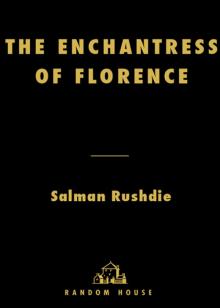 The Enchantress of Florence
The Enchantress of Florence Imaginary Homelands: Essays and Criticism 1981-1991
Imaginary Homelands: Essays and Criticism 1981-1991 Joseph Anton: A Memoir
Joseph Anton: A Memoir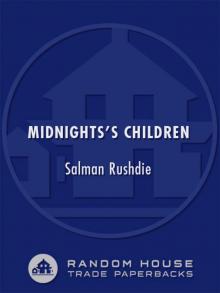 Midnight's Children
Midnight's Children East, West: Stories
East, West: Stories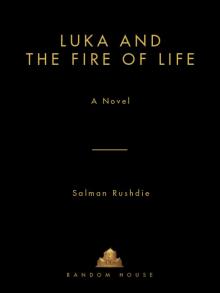 Luka and the Fire of Life
Luka and the Fire of Life Fury Fury Fury
Fury Fury Fury Haroun and the Sea of Stories
Haroun and the Sea of Stories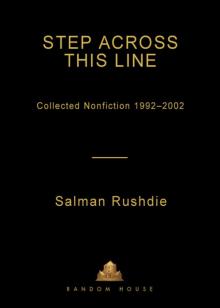 Step Across This Line: Collected Nonfiction 1992-2002
Step Across This Line: Collected Nonfiction 1992-2002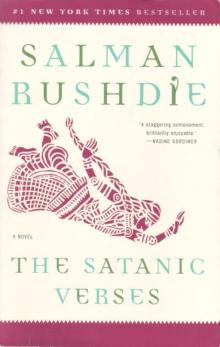 The Satanic Verses
The Satanic Verses The Moor's Last Sigh
The Moor's Last Sigh The Prophet's Hair
The Prophet's Hair The Ground Beneath Her Feet
The Ground Beneath Her Feet Two Years Eight Months and Twenty-Eight Nights
Two Years Eight Months and Twenty-Eight Nights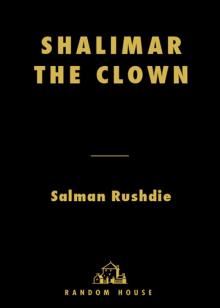 Shalimar the Clown
Shalimar the Clown Grimus
Grimus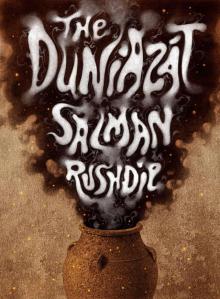 The Duniazát
The Duniazát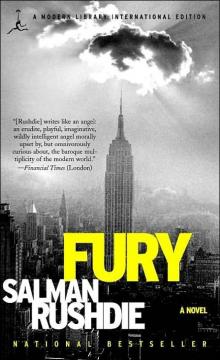 Fury
Fury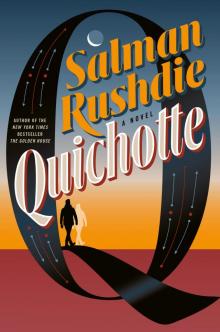 Quichotte
Quichotte The Jaguar Smile
The Jaguar Smile Joseph Anton
Joseph Anton Joseph Anton: A Memoir: A Memoir
Joseph Anton: A Memoir: A Memoir Imaginary Homelands
Imaginary Homelands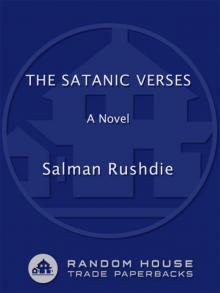 The Satanic Verses: A Novel
The Satanic Verses: A Novel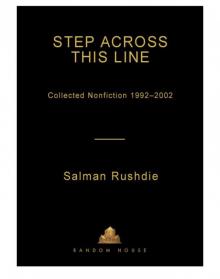 Step Across This Line
Step Across This Line East, West
East, West